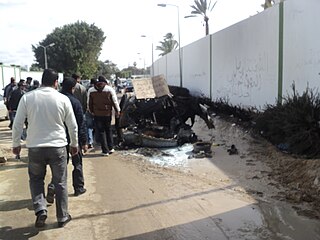Economic sanctions or embargoes are commercial and financial penalties applied by states or institutions against states, groups, or individuals. Economic sanctions are a form of coercion that attempts to get an actor to change its behavior through disruption in economic exchange. Sanctions can be intended to compel or deterrence.
An arms embargo is a restriction or a set of sanctions that applies either solely to weaponry or also to "dual-use technology." An arms embargo may serve one or more purposes:

United Nations Security Council Resolution 1916, adopted unanimously on March 19, 2010, after recalling resolutions 733 (1992), 1519 (2003), 1558 (2004), 1587 (2004), 1630 (2005), 1676 (2006), 1724 (2006), 1744 (2007), 1766 (2007), 1772 (2007), 1801 (2008), 1811 (2008), 1844 (2008), 1853 (2008), 1862 (2009), 1894 (2009) and 1907 (2009), the Council extended the term of the Monitoring Group for 12 months and expanded its mandate to include the monitoring of the arms embargo on Eritrea in addition to Somalia.

United Nations Security Council resolution 1011, adopted unanimously on 16 August 1995, after recalling resolutions 918 (1994), 997 (1995) and 1005 (1995) on the situation in Rwanda, the Council suspended the arms embargo against the Government of Rwanda.

United Nations Security Council resolution 1132, adopted on 8 October 1997, after expressing concern at the situation in Sierra Leone, the council, acting under Chapter VII of the United Nations Charter, imposed an oil and arms embargo on the country.

United Nations Security Council resolution 1343, adopted unanimously on 7 March 2001, after recalling resolutions on Sierra Leone and the region, including resolutions 1132 (1997), 1171 (1998) and 1306 (2000), the Council demanded that Liberia end its support for rebels in Sierra Leone and threatened the imposition of wide-ranging sanctions unless the country complied with the Security Council.

United Nations Security Council Resolution 1952, adopted unanimously on November 29, 2010, after recalling previous resolutions on the situation in the Democratic Republic of the Congo, including resolutions 1807 (2008), 1857 (2008) and 1896 (2009), the Council renewed an arms embargo and related targeted sanctions for a further period until November 30, 2011.

United Nations Security Council resolution 1596, adopted unanimously on 18 April 2005, after recalling all previous resolutions on the situation in the Democratic Republic of the Congo, including resolutions 1493 (2003), 1533 (2004), 1552 (2004), 1565 (2004) and 1592 (2005), the council expanded the arms embargo to include all recipients of weapons in the country, and imposed a travel ban and asset freeze on those violating the embargo.

United Nations Security Council Resolution 1970 was a measure adopted unanimously by the UN Security Council on 26 February 2011. It condemned the use of lethal force by the government of Muammar Gaddafi against protesters participating in the Libyan Civil War, and imposed a series of international sanctions in response.

United Nations Security Council Resolution 1649, adopted unanimously on 21 December 2005, after recalling all previous resolutions on the situation in the Democratic Republic of the Congo, including resolutions 1533 (2004), 1565 (2004), 1592 (2005), 1596 (2005) and 1616 (2005), 1621 (2005) and 1628 (2005), the council extended and expanded sanctions against the country until 31 July 2006, and demanded that foreign fighters disarm or face sanctions.

United Nations Security Council Resolution 1683, was adopted unanimously on June 13, 2006, after recalling all previous resolutions on the situation in Liberia and West Africa. The Council adjusted the arms embargo against the country so that weapons and ammunition could be used for training purposes by the government, police and security forces.

United Nations Security Council Resolution 1698, adopted unanimously on July 31, 2006, after recalling all previous resolutions concerning the situation in the Democratic Republic of the Congo, including resolutions 1493 (2003), 1533 (2004), 1552 (2004), 1565 (2004), 1592 (2005), 1596 (2005), 1616 (2005), 1649 (2005) and 1654 (2006), the Council renewed sanctions against the country until July 31, 2007.

United Nations Security Council Resolution 1724, adopted unanimously on November 29, 2006, after recalling previous resolutions on the situation in Somalia, particularly resolutions 733 (1992), 1519 (2003), 1558 (2004), 1587 (2005), 1630 (2006) and 1676 (2006), the Council re-established a group to monitor the arms embargo against the country for a further six months and condemned an increase in the flow of weapons to the country.

United Nations Security Council Resolution 2002, adopted unanimously on July 29, 2011, after recalling resolutions 733 (1992), 1519 (2003), 1558 (2004), 1587 (2004), 1630 (2005), 1676 (2006), 1724 (2006), 1744 (2007), 1766 (2007), 1772 (2007), 1801 (2008), 1811 (2008), 1844 (2008), 1853 (2008), 1862 (2009), 1907 (2009), 1916 (2010) and 1972 (2011), the Council tightened sanctions against Eritrea and Somalia to include individuals and entities recruiting or using child soldiers in the Somali Civil War, in addition to those responsible for attacks against schools and hospitals in Somalia.
United Nations Security Council Resolution 1768 was unanimously adopted on 31 July 2007.
United Nations Security Council Resolution 1896 was unanimously adopted on 30 November 2009.
United Nations Security Council Resolution 1807 was unanimously adopted on 31 March 2008.
United Nations Security Council Resolution 1857 was unanimously adopted on 22 December 2008.

United Nations Security Council Resolution 2021 was unanimously adopted on 29 November 2011.

United Nations Security Council Resolution 2093 was unanimously adopted on 6 March 2013.














